Professor Dagomar Degroot, Ph.D., Founder and Co-Director
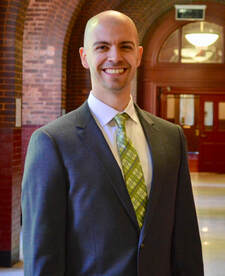
I am an associate professor of environmental history at Georgetown University. I use evidence from historical and scientific archives to identify past climate changes and social responses. I am especially interested in stories of adaptation and resilience in the face of past climate change, because I believe they can help us prepare for life on a hotter planet.
In 2010, I created this site to share, with as wide an audience as possible, what research into past environmental change and teach us about today's climate crisis. HistoricalClimatology.com now receives roughly 100,000 unique hits a year. It has been cited in popular books and articles, listed among the top resources on climate change, and used widely in high schools and universities.
For more about my work, visit my website.
In 2010, I created this site to share, with as wide an audience as possible, what research into past environmental change and teach us about today's climate crisis. HistoricalClimatology.com now receives roughly 100,000 unique hits a year. It has been cited in popular books and articles, listed among the top resources on climate change, and used widely in high schools and universities.
For more about my work, visit my website.
Ph.D. Student Bryna Cameron-Steinke, Co-Director
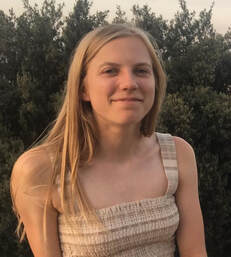
I am a Ph.D. student in environmental history at Georgetown University. I study the environmental history of northwestern continental Europe in the early Middle Ages (6th-10th centuries), focusing on the development and use of marginal landscapes, namely marshlands and woodlands.
My approach is interdisciplinary and combines textual and scientific data (palynological and paleoclimatic). I am interested in how climate change and infectious disease influenced the cultures and economies of marginal regions. In particular, I explore the threat vector-borne diseases posed and how landscape and climate change impacted disease prevalence. Before coming to Georgetown, I completed a bachelor’s degree in History and Organismal Biology from McGill University and a master’s degree in Medieval Studies from the University of Toronto’s Centre for Medieval Studies.
My approach is interdisciplinary and combines textual and scientific data (palynological and paleoclimatic). I am interested in how climate change and infectious disease influenced the cultures and economies of marginal regions. In particular, I explore the threat vector-borne diseases posed and how landscape and climate change impacted disease prevalence. Before coming to Georgetown, I completed a bachelor’s degree in History and Organismal Biology from McGill University and a master’s degree in Medieval Studies from the University of Toronto’s Centre for Medieval Studies.
Ph.D. Student Camden Elliott, Features Editor
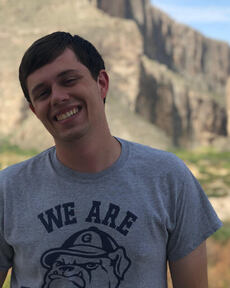
I am a PhD student at Harvard University, where I focus on early American environmental history.
My interests primarily lie at the intersection of warfare and the environment through the lens of disease history. Currently I’m working on a few interconnected projects, including an environmental history of an early American slave revolt, a history of sick war horses, and a broader project on the environmental dimensions of the global Seven Years’ War. My work is broadly interdisciplinary, utilizing scholarship produced in both the humanities and the natural sciences.
My interests primarily lie at the intersection of warfare and the environment through the lens of disease history. Currently I’m working on a few interconnected projects, including an environmental history of an early American slave revolt, a history of sick war horses, and a broader project on the environmental dimensions of the global Seven Years’ War. My work is broadly interdisciplinary, utilizing scholarship produced in both the humanities and the natural sciences.
Postdoctoral Researcher Katrin Kleemann, M.A., Social Media Editor
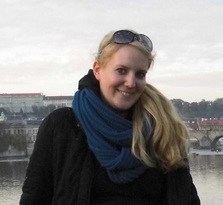
I am a postdoctoral researcher at the history department at the University of Freiburg in Germany, where I analyze the impacts and perceptions of volcanic eruptions and earthquakes in the early modern period. In the spring of 2021, I will be a Barbara S. Mosbacher fellow at the John Carter Brown Library in Providence, Rhode Island.
In July 2020, I graduated from the doctoral program “Environment and Society” at the Rachel Carson Center at LMU Munich in Germany, with a major in history and a minor in geology. My doctoral project investigated the Icelandic Laki fissure eruption of 1783. I analyzed its impacts on the northern hemisphere and how contemporaries perceived, explained, and coped with the phenomena caused by the eruption. My findings will be published in 2021 with De Gruyter’s “Historical Catastrophe Studies” series. During my doctoral degree, I received a fellowship from the Andrea von Braun Foundation, which supports interdisciplinary research.
In July 2020, I graduated from the doctoral program “Environment and Society” at the Rachel Carson Center at LMU Munich in Germany, with a major in history and a minor in geology. My doctoral project investigated the Icelandic Laki fissure eruption of 1783. I analyzed its impacts on the northern hemisphere and how contemporaries perceived, explained, and coped with the phenomena caused by the eruption. My findings will be published in 2021 with De Gruyter’s “Historical Catastrophe Studies” series. During my doctoral degree, I received a fellowship from the Andrea von Braun Foundation, which supports interdisciplinary research.
Ph.D. Student Emma Moesswilde, Climate History Podcast Co-Host
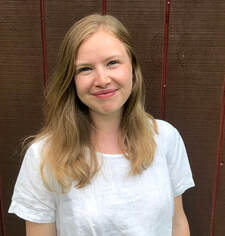
I am a PhD student in history at Georgetown University, where I study the environmental history of Britain in the long eighteenth century.
I am particularly interested in the study of agricultural history and the role of agriculture in changing landscape and culture in the Enlightenment period. My current research topics include the improvement projects of the British Board of Agriculture, the role of climate in changing agricultural practices, and how and why individuals from different backgrounds worked together to effect widespread environmental change in the Enlightenment. My work occurs at the intersections of environmental history, the history of science, the history of ideas, and climate history, and investigates the motivation behind improvement projects, such as enclosure, and the environmental and cultural factors that helped those projects fail or succeed.
I am particularly interested in the study of agricultural history and the role of agriculture in changing landscape and culture in the Enlightenment period. My current research topics include the improvement projects of the British Board of Agriculture, the role of climate in changing agricultural practices, and how and why individuals from different backgrounds worked together to effect widespread environmental change in the Enlightenment. My work occurs at the intersections of environmental history, the history of science, the history of ideas, and climate history, and investigates the motivation behind improvement projects, such as enclosure, and the environmental and cultural factors that helped those projects fail or succeed.
